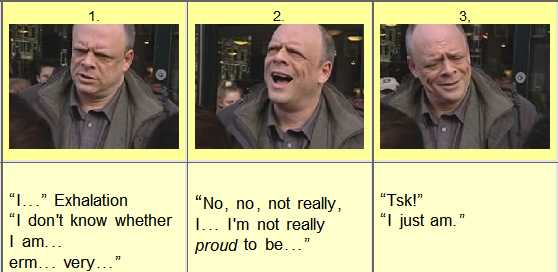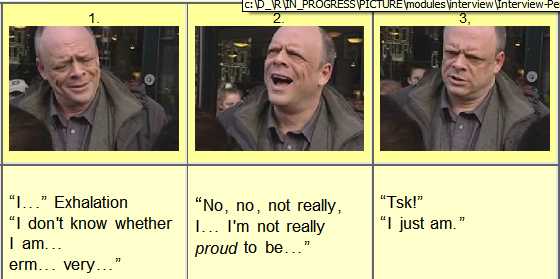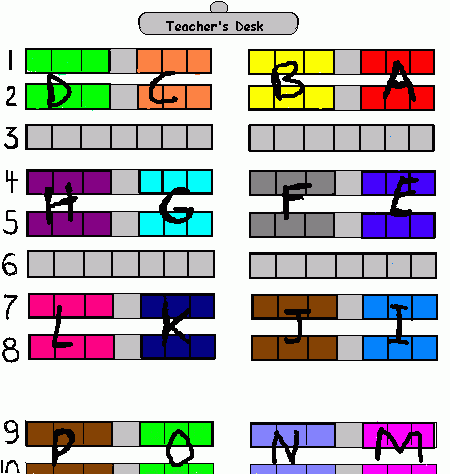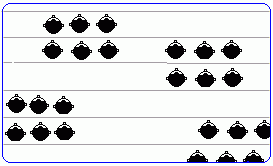|
ARCHIVE EXAM (and other) NEWS
For students who did not receive the email sent on May 30th, here is a copy:; Ciao,
Alcune notizie e commenti...
(1.) L'altro ieri ho mandato in giro una email sul recente affossamento del tentativo di varare nuovi programmi a Roma Tre -- più interessanti e più utili -- per gli studenti di Lingue. Poi ho pensato che forse a voi del primo anno, soprattutto voi del primo anno del curriculum OCI, l'avviso potrebbe sembrare campato in aria. Infatti, molti di voi mi avete detto di essere, anzi, contenti dei corsi che seguite questo semestre (come cinese, arabo, antropologia, il nostro corso d'inglese, ecc.), il che mi fa naturalmente piacere. Quindi non vedete la necessità di varare nuovi programmi, già quelli attuali sembrano interessanti ed utili. Inoltre siccome nessuno di voi (mi pare) ha l'intenzione di abbandonare gli studi, i dati comunicati sul "70% degli studenti che abbandonano" possono sembrare surreali.
Invece dovete ricredervi. Sono sì veri i dati, com'è vero lo scontento -- non tanto quello per il mal funzionamento organizzativo, problema che rende difficile il presente ma che non condiziona il vostro futuro, bensì lo scontento verso i programmi di studio offerti e la formazione effettivamente data (cose che condizionano sì il vostro avvenire, eccome!!). Per convincervene, basta leggere la raccolta di lettere degli studenti che appare sul mio sito: http://patrick.boylan.it/misc/riforma2.htm
Il fatto è che questo disagio si fa sentire al secondo anno (per molti studenti LL invece, già sin dal primo anno) e soprattutto al terzo anno, quando si ha fretta di finire al più presto e quindi nessuna disponibilità a cercare di cambiare le cose. E quindi le cose non cambiano.
Perciò nell'inviare in giro l'email dell'altro ieri, vi ho incluso per due motivi:
-- per prepararvi psicologicamente in modo che, arrivati al secondo e al terzo anno, non vi scoraggiate e soprattutto non abbandonate (avrete già messo in conto tutto ciò),
-- per incoraggiarvi a prendere parte attiva sin da ora nella vita politica e organizzativa dell'università, mentre avete ancora una certa disponibilità. L'avete già fatto, ad esempio andando a votare in massa alle ultime elezioni studentesche (il che ha garantito il quorum). Quindi il mio incoraggiamento è di continuare così.
(2.) Ho parlato con la prof. Maclaren che spera di essere in grado di affiggere i risultati dell'esame "scritto" L-Lin/12 (la prova lettori) lunedì prossimo (4 giugno). Li affiggerà all'esterno della stanza Lettori. Indicherà solo i promossi. Stando almeno alle correzioni che ha completato fino ad oggi, tutti voi frequentanti siete promossi (come avevo previsto).
In quanto ai voti, non li potrà affiggere e, sebbene me li comunicherà, non li potrò affiggere neanch'io (nel mio caso, sul nostro sito) per il motivo che descrivo qui: http://boylan.interfree.it/personal/e-l-disc.htm
(3.) In pratica, dunque, dovrete prenotarvi per l'ORALE L-Lin/12 (Inglese) senza sapere i risultati dello SCRITTO. (Questo discorso vale, naturalmente, solo se pensate di dare l'esame finale ORALE il giorno 12.6.07. Potete anche darlo il 26.6.07 e in tal caso avete tempo per prenotarvi.)
Infatti,
per quelli che vogliono prenotarsi per il 12.6, scade la
prenotazione il 5.6 (una settimana prima dell'orale) e forse la
prof. Maclaren non ce la fa ad affiggere i risultati per il 4.
Quindi potete andare sin da ora sul sito
http://prenota.uniroma3.it.
Indicate BOYLAN (soltanto, non mettere corso di laurea o facoltà)
e iscrivetevi:
C'è scritto di presentarvi alle 9.30 ma questo vale per i non frequentanti a cui farò fare (se non sono troppo numerosi) una prova scritta iniziale, prima dell'interrogazione. In quanto a voi, avete solo una domanda orale e poi la verbalizzazione, quindi potete presentarvi fine mattinata o nel pomeriggio, scaglionati per non dover attendere eccessivamente.
Anzi, siccome siete in tanti, l'ottimale sarebbe che metà vengano il 12.6 e metà il 26.6. So che tutti vogliono venire il 12.6 ma faccio la proposta seguente che potete seguire o non seguire a vostro piacimento (ma se non lo seguite, niente lamentele per le lunghe attese, per favore!):
il 12.6 dopo le ore 11 i gruppi A B (quelli creati per il PRIMO modulo) il 12.6 dopo le ore 14 i gruppi C D E F ( " " " )
il 26.6 dopo le ore 11 i gruppi G H I ( " " " ) il 26.6 dopo le ore 14 i gruppi J K L M N ( " " " )
Ripeto, queste indicazioni non sono tassative, sono orientative per evitare l'affollamento. Siete liberi di organizzarvi come vi pare.
(4.) Alcuni di voi mi avete scritto chiedendo su che cosa verteranno le domande all'esame finale. Ecco la risposta:
Le domande verteranno sulle discussioni in aula (non sui testi al programma) così come risultano dai RECAP OF LESSONS (cliccate su questa voce nella menu principale del sito), dalle spiegazioni dei Tasks nella rubrica TASKS e dalle NOTIZIE, comprese le discussioni sul Bulletin Board del nostro corso (cliccate su NEWS e poi sul tasto arancione nel riquadro rosso "Students' Bulletin Board.")
E' tutto.
Ecco alcuni esempi di domanda:
(a.) In the first module, most students had difficulty in making a qualitative questionnaire that would permit them to understand REALLY a Trinity College student's Anglo cultural values. It was the same difficulty that they had in the second module, in establishing the values and maxims for the Anglo double that they chose to internalize. What was the problem and what solution have I suggested to overcome it?
La risposta a questa domanda si trova in mille discussioni in classe (sotto RECAP) ma viene articolato in modo conciso e preciso nel mio chat con Ester a proposito del suo personaggio nigeriano. Il chat è quello più recente (o uno dei più recenti, non mi ricordo) che appare sul nostro Bulletin Board. (In realtà, viene dato un link per leggere la risposta sul mio sito privato.) Questo chat contiene anche altri spunti per possibili domande, quindi va letto.
(b.) For Task 2 (Module II) you had to spend a day at home as your double. I claimed that, although you spoke only Italian during the day, you were actually learning to speak English. In what sense is this true?
Anche
in questo caso, la risposta a questa domanda si trova in mille
discussioni in classe (sotto RECAP) ma viene articolato in modo
conciso e preciso nel mio commento (in giallo) in fondo al Task 2
Report scritto da Silvia (Evangelista). Il link si trova nella
sezione NOTIZIE prima dei 12 report segnalati come quelli più
interessanti. Non bisogna leggere tutti i Report, naturalmente,
ma soltanto quello di Silvia -- essa andava chiaramente letto
perché c'è scritto sopra:
Pure in questo caso il commento al lavoro di Silvia contiene anche altri spunti per possibili domande, quindi va letto.
Un altro esempio di domanda:
(c.) On 14.3.07, we talked about accommodating your English to the way of speaking of your interlocutor, whether British or Pakistani or whatever. However I said that in some cultures, like traditional Japanese culture, people do not want foreigners to accommodate to their way of speaking and acting. They want foreigners to remain foreigners (“in their place”). How do you accommodate in such cases?
Per la risposta leggi il RECAP del 14.3.07.
Ultima domanda, stra-insidiosa:
(d.) On 18/04/07, we talked about the 7 social functions of discourse given by Halliday in "Language as social semiotic". I said that in doing the questionnaire task, you learned to carry out the HEURISTIC function in English. In writing your report of the interview, you learned to carry out the INFORMATIVE function in English. You practiced some of the other functions in the various other activities you did for this course -- but not NOT ALL the functions, since there was not enough time. Which of the 7 functions did this course NOT teach you to use in English?
La risposta non c'è scritta da nessuna parte, tocca a voi formularla.
(5.) Metterò sul sito il giorno prima dell'esame finale i totali che avete ottenuti con i task e gli esoneri, sia per il primo modulo che per il secondo modulo. Ma attenzione: il voto accumulato sarà il totale matematico meno due punti. Ciò rappresenta il voto minimo assolutamente garantito anche se fate scena muta o dite delle oscenità.
Se dite cretinate ma non oscenità, il punteggio che appare sul sito verrà aumentato da un punto (o detto in altre parole, il voto totale che avete guadagnato con i task e gli esoneri sarà diminuito da un solo punto).
Se dite cose incomplete o non del tutto vero, il punteggio che appare sul sito verrà aumentato da due punti (e così pareggiate, ossia tornate al punteggio pieno che avete guadagnato con i lavori).
Se invece dite cose intelligenti (o stra-intelligenti), avrete un altro punto (o due) in più
Insomma con questo sistema, quello di partire dal voto già decurtato di due punti, non potete che guadagnare qualcosa (a meno di non dire oscenità)!
Sembra tutto un gioco di parole? Beh, come sapete, questo è quello che penso dei voti.
(6.) Ho affisso sul sito del nostro corso, sotto NOTIZIE: http://patrick.boylan.it/courses/06-07/m_I-2o-l.htm#NEWS i migliori Task 2 (del secondo modulo) e i video della prova orale (secondo modulo). Anzi, ho messo i video su YouTube: visitando la pagina NOTIZIE troverete i links per vederli.
I primi 4 studenti hanno vinto un oscar per la loro interiorizzazione di un "modo di vedere" e di un "modo di esprimersi" anglosassoni. Complimenti e state attenti a come vi comportate, ora che siete degli star; Corona (quel paparazzo ricattatore) è stato rilasciato ieri dalla galera e potrebbe essere in agguato!
Scherzi a parte, stanno avendo successo, i video, a quanto pare. Già ho avuto l'email seguente -- e dico sul serio -- per uno dei vincitori, anzi per una delle vincitrici (non dico chi per discrezione) : "She's cute... Is she single?" Sempre per discrezione non ho risposto. (E neanche so la risposta.)
Ciao ciao,
P
29/05/2007 (8.49.36)
_______________________________
Next Friday, May 4th, no
lesson. Our room, Aula A, will be used for an encounter
with Paolo Vaciago to explain the ERASMUS* program. It is
in your interest to attend: you will find out how best to present
your candidacy (the number of places is limited).
The evaluation sheet for TASK 1 (Module II) has been added to the section TASK 1 (click on “Research Tasks in the main menu or click here. ___________________________
On May 2nd each group will name a new Group Leader (L3). ___________________________ All Tasks for Module
I must be consigned, corrected by the Group Leader, by May
2nd. I will not accept any task done after that date
for Module I. ___________________________ Task 1 (first part) for Module II, the CULTURAL IDENTI-KIT OF A DOUBLE, is also due on May 2nd, corrected by the Group Leader. NOTE: For the instructions and evaluation sheet for Task 1, see the section “Module II, Task 1” or click here.
___________________________ If you want to find
blogs with videos, enter a “string” (series of
indications) like this into Google: For an explanation, see the section “Module II, Task 1” or click here.
___________________________
Students
not in original group photos: Please
check the group photo of the “extra students”
(including YOU) and tell me which one you are. Example: “I
am the second from the left in the bottom row.” To see the
photo page click here>
To the students of English I for minors:
I was not able to examine all groups for the "esonero orale" on April 4th. I will therefore continue the exam (for those groups that I did not hear) on April 16th, from 3 to 5 pm.
This means that the FIRST LESSON of the new module will NOT be on April 16th, as scheduled, but rather on April 18th.
This also means that Task 4, due on April 16th, will be due on April 18th.
Note that the lessons will take place on Monday, Wednesday and Friday, i.e. THREE days per week, just like during the first module. (Note: There is a mistake on the monitors which indicate only two days).
Because of my engagements outside Italy, we will have three lessons, then an interruption, then the remaining lessons. The dates are:
Module 2: April 18 20 23 May 2 4 7 9 11 14 (esoneri: 16 18)
See you on the 18th for the beginning of the new module.
THE
LESSON ON MARCH 30th WILL TAKE PLACE AS USUAL. THERE
IS A STRIKE THAT DAY FOR PUBLIC SERVICE WORKERS BY THE RdB, A
SMALL UNION TO WHICH I DO NOT BELONG. TRANSPORTATION WILL
BE NORMAL EXCEPT FOR THE FOLLOWING LINES IN THE SUBURBS
(PERIFERIA) OF ROME: 03 [cioè, non il tram 3 che circola
dentro Roma, ma il bus 03 che serve la periferia], 09, 016, 017,
023, 024, 025, 028, 030, 031, 032, 033, 035, 036, 037, 039, 040,
041, 044, 053, 056, 057, 059, 077, 078, 146, 213, 218, 220, 222,
232, 314, 334, 343, 344, 404, 437, 444, 447, 449, 502, 503, 543,
546, 552, 554, 557, 657, 663, 701, 701L, 702, 763, 764, 767, 768,
771, 777, 778, 808, 881, 889, 892, 907, 912, 982, 983, 985, 992,
997, 998 e 998L e 01.
10:30
pm. I just put the Correction Sheet for Task 1 on line. Now I'm
going to have dinner and then do the guidelines for writing your
report on your ethnographic interview. Group
leaders: please give me the names of the students
NOTE:
THERE IS AN ERROR IN SUB-GOAL B: APPENDIX C
Homework
assignment for Monday, March 5th
– Change your group leader on Monday (March 5th): your leader will be L2. Group leaders: please check that everyone in your group has enrolled. If someone has not yet enrolled, the problem might be unfamiliarity with the computer. Show that person the “PC Help” list on the class web site (under “ROLL” in the main menu) and tell the person to phone one of the volunteers for help.
|
|

USEFUL INFORMATION |

INFORMAZIONE
UTILE |
|
FOR OUR FIRST LESSON: WHILE WAITING FOR THE FIRST LESSON TO BEGIN...
|
|
|
(Archive currently empty)
Use
browser
|
|





